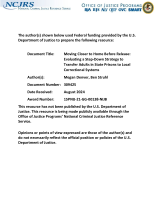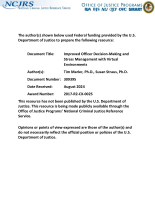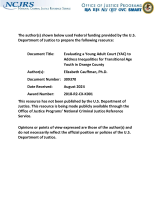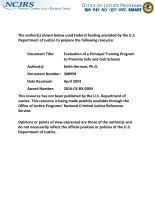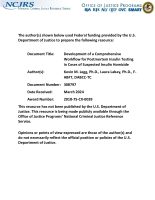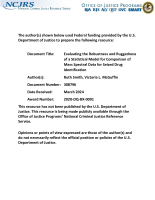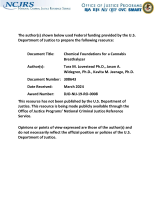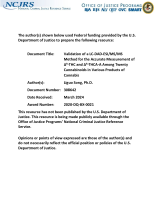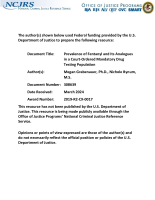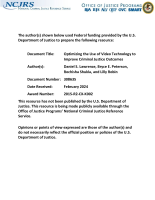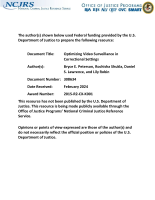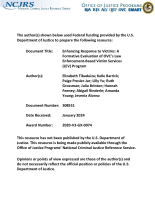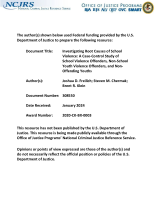Research design
Improved Officer Decision-Making and Stress Management with Virtual Environments
Evaluating a Young Adult Court (YAC) to Address Inequalities for Transitional Age Youth in Orange County
Improved Nucleic Acid Recovery From Trace and Degraded Samples Using Affinity Purification
Understanding the Potential for Multidisciplinary Threat Assessment and Management Teams to Prevent Terrorism: Conducting a Formative Evaluation of the MassBay Threat Assessment Team
Healthy Adolescent Relationship Trajectories Study
Assessing for Impact: Key Elements to Successful Group Mentoring at the Boys & Girls Club of Metro Atlanta
Evaluation of a Principal Training Program to Promote Safe and Civil Schools
Building "A Beautiful Safe Place for Youth" Through Problem-oriented Community Organizing: A Quasi-experimental Evaluation
Webinar Transcript: Fiscal Year 2024 Evaluating Strategies to Advance the Implementation of Evidence-Based Policies and Practices Solicitation
This webinar provided an overview of the NIJ FY 2024 Evaluating Strategies to Advance the Implementation of Evidence-Based Policies and Practices solicitation, in which...
Participatory Mapping of Holistic Youth Well-Being: A Mixed Methods Study
Webinar Transcript: NIJ FY 2024 Research and Evaluation on School Safety
This webinar provided information on the NIJ FY 2024 Research and Evaluation on School Safety solicitation. In collaboration with BJA, this solicitation will seek applications for rigorous research and evaluation projects to fill knowledge gaps in two topical areas:
- Studies on the root causes and consequences of school...
Development of a Comprehensive Workflow for Postmortem Insulin Testing in Cases of Suspected Insulin Homicide
Evaluating the Robustness and Ruggedness of a Statistical Model for Comparison of Mass Spectral Data for Seized Drug Identification
Webinar Transcript: NIJ FY 2024 Research and Evaluation on Youth Justice Topics
This webinar will provide an overview of the NIJ FY 2024 Research and Evaluation on Youth Justice Topics solicitation. In collaboration with the Office of Juvenile Justice and Delinquency Prevention, NIJ seeks applications for research and evaluation projects that inform policy and practice in the field of...
Chemical Foundations for a Cannabis Breathalyzer
Validation of a LC-DAD-ESI/MS/MS Method for the Accurate Measurement of Δ9-THC and Δ9-THCA-A Among Twenty Cannabinoids in Various Products of Cannabis
Prevalence of Fentanyl and Its Analogues in a Court-Ordered Mandatory Drug Testing Population
Optimizing the Use of Video Technology to Improve Criminal Justice Outcomes
Optimizing Video Surveillance in Correctional Settings
Webinar Transcript: FY 2024 NIJ Graduate Research Fellowship Program
Deadline notice
The deadline to submit an application under the solicitation discussed below has passed.
NIJ held a webinar on February 14, 2024, gave an overview of NIJ’s Graduate Research Fellowship opportunity, which invites applications for doctoral dissertation research that is relevant to preventing and controlling crime, advancing knowledge of victimization and effective victim services, or ensuring the fair and impartial administration...
FBI Laboratory Decision Analysis Studies in Pattern Evidence Examinations


